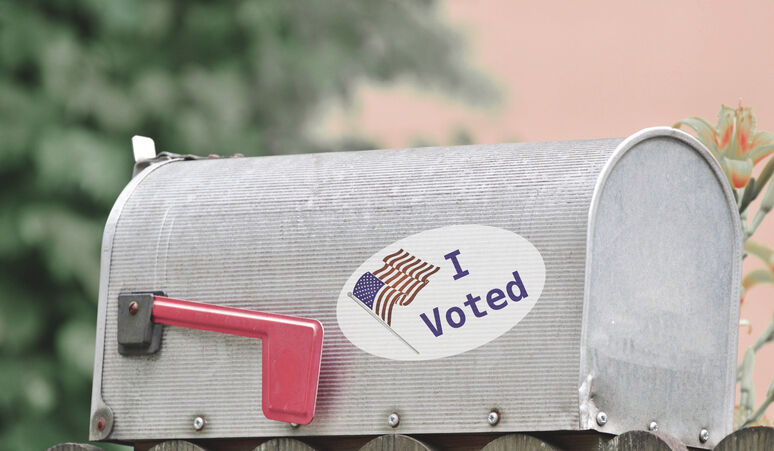PHOENIX — Arizonans will be able to continue to vote early despite efforts by the Arizona Republican Party to have the practice declared illegal.
The Arizona Supreme Court on Friday rejected the state GOP’s arguments that allowing people to fill out their ballots at their kitchen tables, or anywhere else, runs afoul of a constitutional provision requiring “secrecy in voting shall be preserved.’’
There was no explanation of the decision. But in declining to consider the Republican Party’s arguments, the justices left intact an earlier decision by the Arizona Court of Appeals that there are sufficient safeguards built into state law to ensure that each voter’s choices are kept confidential.
The decision is final, as there is no basis to seek review by the U.S. Supreme Court.
The party could ask the Republican-controlled Legislature to repeal the 1991 law that created no-excuse early voting. But the politics of that become difficult, given the broad popularity of early voting. More than eight out of 10 ballots were cast that way in the state’s 2022 election.
Law in place since 1991
Arizona has had some form of early voting almost since the first days of statehood. But it was limited to special circumstances, such as serving overseas in the military or being incapacitated.
In 1991, however, state lawmakers approved no-excuse early voting, allowing anyone to request a ballot be sent to them, which they can fill out and either return by mail, put in a drop box, or take directly to a polling location.
None of that was controversial until after the 2020 election in which Donald Trump lost his bid for a second term as president. While he outpolled Democrat Joe Biden among Arizona voters who went to the polls on Election Day, Biden had a larger edge among those who voted early.
The same pattern held true in 2022’s election for governor, in which Republican Kari Lake had a better than 2-1 margin over Democrat Katie Hobbs in Election Day ballots. But Hobbs more than made up for that with a strong edge among early ballots, ending up with a 17,117-vote victory.
Arguments about early ballots, ranging from the chain of custody to the signature verification process, remain front and center eight months later in Lake’s ongoing bid to overturn the results despite court rulings against her.
Secrecy in voters’ kitchens
The attorney for the state GOP, Alexander Kolodin, in seeking to have the Supreme Court void on-demand early ballots, did not discuss the election results. Instead, he focused on the constitutional requirement “that secrecy in voting shall be preserved.’’
Strictly speaking, Kolodin was not arguing that people can’t have a ballot sent to them by mail.
What he told the justices, though, is that the constitutionally mandated secrecy can be maintained only if an official is present when someone actually casts a ballot and that the official “then watches the voter enclose and seal the ballot in an envelope.’’
Kolodin said that can’t happen if someone is filling out a ballot at a kitchen table and sealing it there.
He said that raises the possibility that someone else is present and watching. Kolodin said it also opens up the possibility that someone could be coerced, or maybe even paid, to vote a certain way.
“Many voters are simply unable to protect themselves and can only vote freely in a system where they are not forced (e.g. in the case of domestic violence) to request a mail-in ballot only to be coerced and intimidated to vote in a certain way when marking their ballots,’’ he argued.
He contended the constitutional solution is to ensure that can’t occur. The only place that can’t happen, he argued, is at polling places, where individuals are protected by everything from a 75-foot perimeter to keep out those who are not voting, to areas where they can fill out their ballots in secret with no one looking over their shoulder to see who they support.
Court finds plenty of safeguards
But the Supreme Court has now left intact the Court of Appeals ruling that nothing in the Arizona Constitution about voting secrecy requires what Kolodin called a “restricted zone.’’
“The Secrecy Clause’s meaning is clear: When providing for voting by ballot or any other method, the legislature must uphold voters’ ability to conceal their choices,’’ wrote appellate judge Cynthia Bailey for herself and the other two judges. “The constitution does not mandate any particular method for preserving secrecy in voting.’’
The requirement is met by other laws, she said.
For example, Bailey said, statutes require voters to “ensure they fill out their ballots in secret and seal the ballot in an envelope that does not disclose the voters’ choices.’’ She also pointed out that state law requires election officials who open the envelopes to take out the ballots without unfolding or examining them, separating the envelope, with the voter’s name, from the voter’s choice.
“At no point can the voter’s identifying information on their ballot envelope be lawfully connected with their vote,’’ Bailey said. “These protections are adequate to ensure the preservation of secrecy in voting.’’
The judges were no more impressed with Kolodin’s arguments that the ability of a voter to voluntarily share their decision with someone else violates the constitutional requirement for secrecy.
Bailey pointed out that state law prohibits taking photographs or videos within 75 feet of a polling place. Another statute makes it a crime to show someone else’s ballot to any person.
Yet she also noted that state lawmakers specifically created an exemption that allows voters to take pictures, and share imaes, of their own ballots with others, without violating any laws.
Get your morning recap of today's local news and read the full stories here: http://tucne.ws/morning





